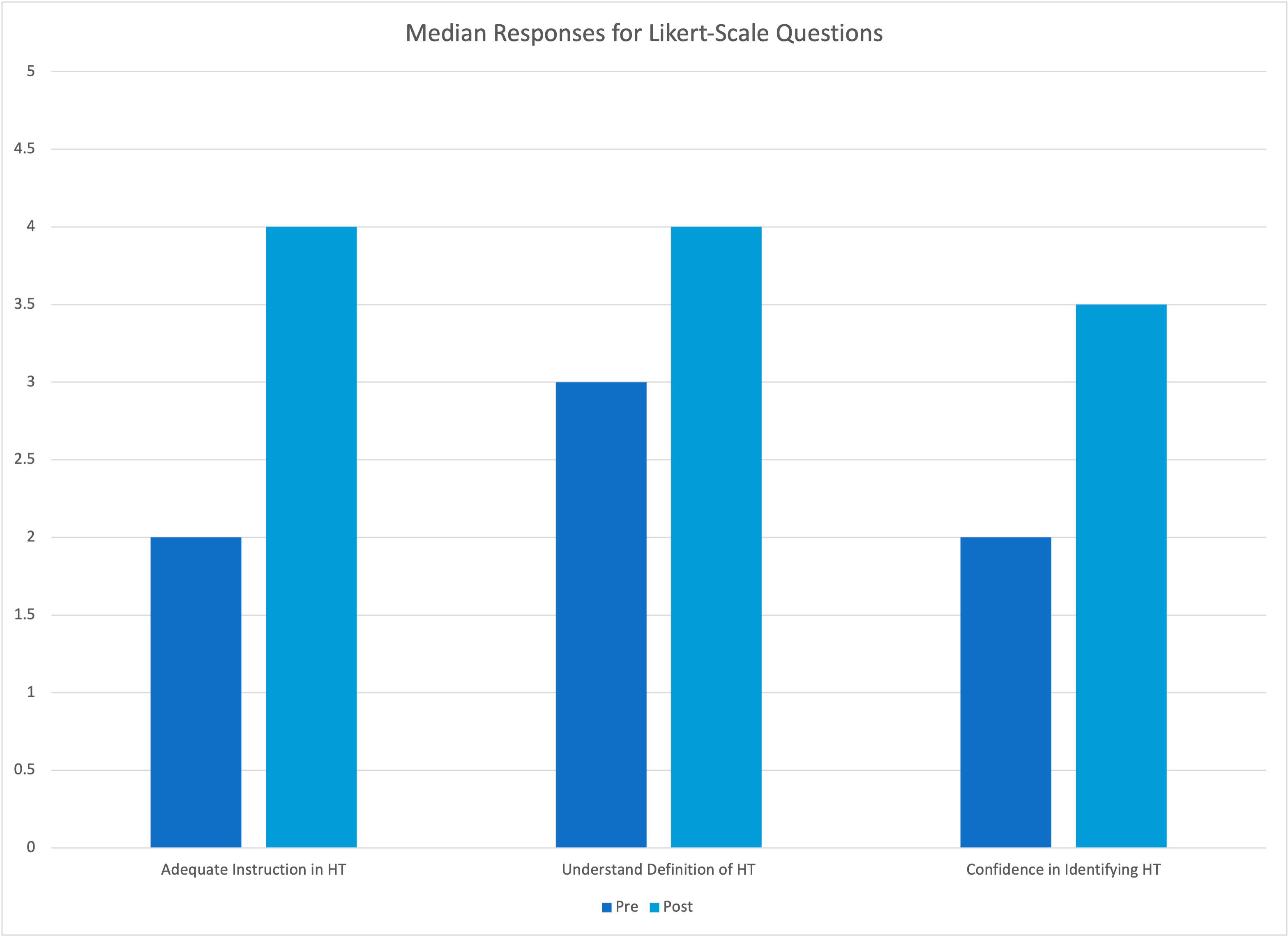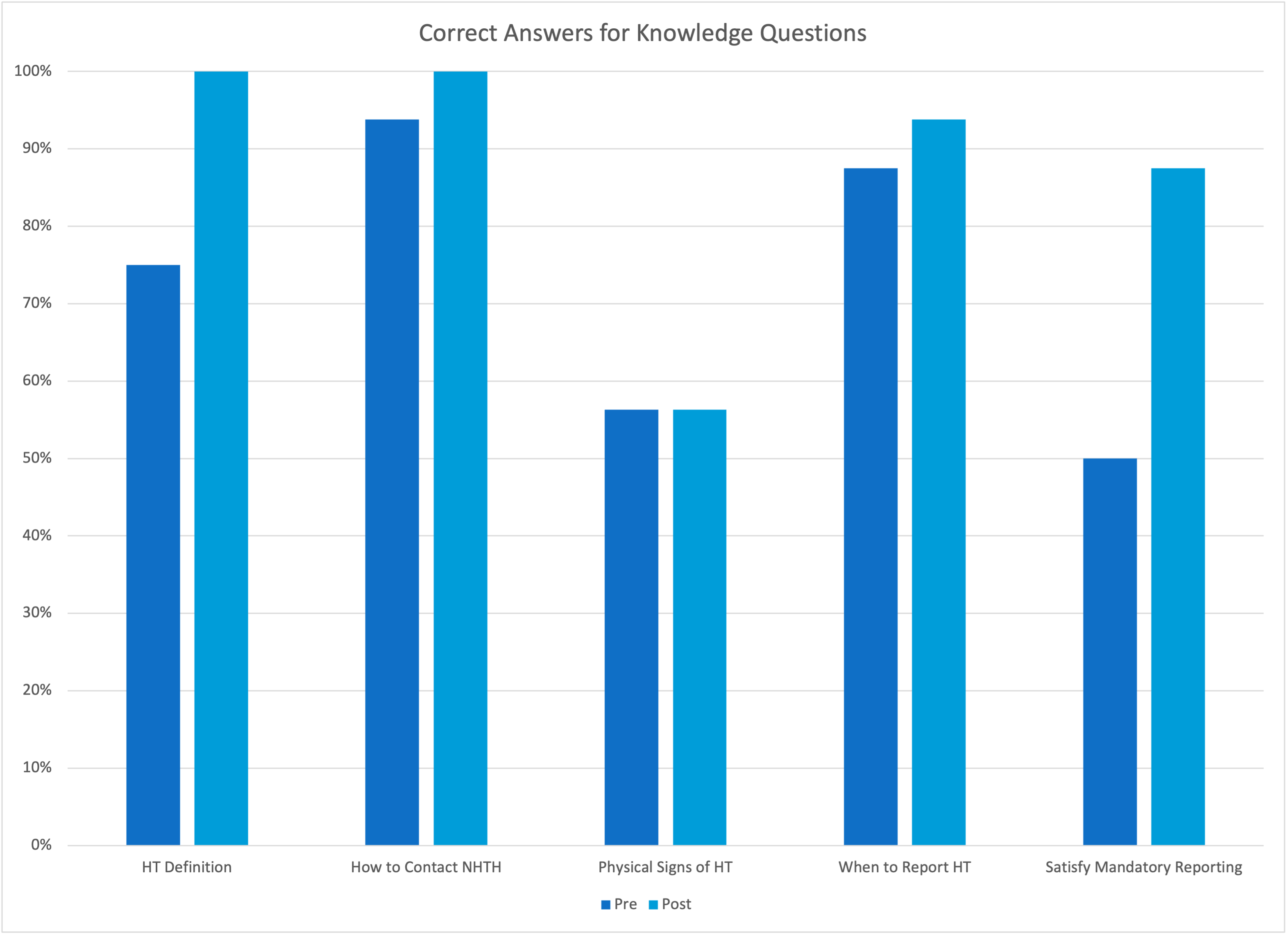Medical Education: Resident
Category: Abstract Submission
Medical Education 13 - Medical Education: Resident IV
257 - Human Trafficking and the Healthcare System: A Pilot Educational Module for Residents
Monday, April 25, 2022
3:30 PM - 6:00 PM US MT
Poster Number: 257
Publication Number: 257.419
Publication Number: 257.419
Naomi Warnick, University of Louisville School of Medicine, Louisville, KY, United States; Olivia Mittel, Department of Pediatrics, University of Louisville School of Medicine, Louisville, KY, United States; Rebecca J. Hart, University of Louisville/Norton Children's Medical Group, Louisville, KY, United States

Naomi Warnick, MD, JD
Resident
University of Louisville School of Medicine
Louisville, Kentucky, United States
Presenting Author(s)
Background:
Human trafficking (HT) is the fastest growing and the third largest organized crime worldwide. In the United States, almost 300,000 youth are at risk for becoming either labor or sex trafficked. Physicians report that they lack sufficient training on human trafficking, which may increase morbidity and mortality among victims.
Objective:
We sought to improve knowledge and understanding of HT among pediatric residents, with the goal of improving recognition and care of patients suspected to be victims of HT as well as preventing trafficking in patients who are at risk.
Design/Methods:
A 15-minute pre-recorded educational module on HT was created and implemented for residents rotating through the pediatric emergency department (PED), including all training levels and rotating subspecialties (pediatrics, emergency medicine, family medicine, and anesthesia). Participating residents completed a pre-module survey consisting of three Likert-scale questions and 5 knowledge-based questions, as well as three questions regarding their prior exposure to human trafficking. A post-module survey consisted of the same Likert and knowledge questions, in addition to open-ended questions for suggestions and improvement. Data were analyzed using descriptive statistics and Wilcoxen-Signed Rank and McNemar’s tests to compare the pre- and post-survey results.
Results:
Sixteen residents completed both the pre-and post-module surveys. Median Likert scores on initial survey were: received adequate instruction on HT 2, understand the definition of HT 3, and confidence to identify a victim of HT. Significant increases in the median Likert score were noted on post-module surveys in each category: received adequate instruction on HT 4 (p=0.002), understand the definition of HT 4 (p=0.003), and confidence to identify a victim of HT 3.5 (p=0.002). The knowledge question regarding complying with child abuse mandatory reporting rules showed a significant increase in correct responses from 50% to 87.5% (p=0.031). While only one of the knowledge questions showed a significant increase in correct responses between pre- and post-module, four of the five questions showed an increase in correct responses.
Conclusion(s):
This pilot study of a human trafficking educational module demonstrated limitations in baseline knowledge amongst residents pertaining to human trafficking, with improvements in resident knowledge and confidence after completing the module. We hope to continue to use this module more broadly and expand education to include standardized patient simulations in the future.
Median Responses for Likert Scale Questions Median Likert scores for all three survey questions showed statistically significant improvement between the pre- and post-module surveys. Median values were: received received adequate instruction on human trafficking 2 and 4 (p=0.002), understand the definition of human trafficking 3 and 4 (p=0.003), and confidence to identify a victim of human trafficking 2 and 3.5 (p=0.002)
Median Likert scores for all three survey questions showed statistically significant improvement between the pre- and post-module surveys. Median values were: received received adequate instruction on human trafficking 2 and 4 (p=0.002), understand the definition of human trafficking 3 and 4 (p=0.003), and confidence to identify a victim of human trafficking 2 and 3.5 (p=0.002)
Percent Correct Responses for Knowledge Questions The knowledge question regarding complying with child abuse mandatory reporting rules showed a significant increase in correct responses from 50% to 87.5% (p=0.031). The remainder of the knowledge questions showed an improvement or no change in precent correct answers, although not statically significant.
The knowledge question regarding complying with child abuse mandatory reporting rules showed a significant increase in correct responses from 50% to 87.5% (p=0.031). The remainder of the knowledge questions showed an improvement or no change in precent correct answers, although not statically significant.
Human trafficking (HT) is the fastest growing and the third largest organized crime worldwide. In the United States, almost 300,000 youth are at risk for becoming either labor or sex trafficked. Physicians report that they lack sufficient training on human trafficking, which may increase morbidity and mortality among victims.
Objective:
We sought to improve knowledge and understanding of HT among pediatric residents, with the goal of improving recognition and care of patients suspected to be victims of HT as well as preventing trafficking in patients who are at risk.
Design/Methods:
A 15-minute pre-recorded educational module on HT was created and implemented for residents rotating through the pediatric emergency department (PED), including all training levels and rotating subspecialties (pediatrics, emergency medicine, family medicine, and anesthesia). Participating residents completed a pre-module survey consisting of three Likert-scale questions and 5 knowledge-based questions, as well as three questions regarding their prior exposure to human trafficking. A post-module survey consisted of the same Likert and knowledge questions, in addition to open-ended questions for suggestions and improvement. Data were analyzed using descriptive statistics and Wilcoxen-Signed Rank and McNemar’s tests to compare the pre- and post-survey results.
Results:
Sixteen residents completed both the pre-and post-module surveys. Median Likert scores on initial survey were: received adequate instruction on HT 2, understand the definition of HT 3, and confidence to identify a victim of HT. Significant increases in the median Likert score were noted on post-module surveys in each category: received adequate instruction on HT 4 (p=0.002), understand the definition of HT 4 (p=0.003), and confidence to identify a victim of HT 3.5 (p=0.002). The knowledge question regarding complying with child abuse mandatory reporting rules showed a significant increase in correct responses from 50% to 87.5% (p=0.031). While only one of the knowledge questions showed a significant increase in correct responses between pre- and post-module, four of the five questions showed an increase in correct responses.
Conclusion(s):
This pilot study of a human trafficking educational module demonstrated limitations in baseline knowledge amongst residents pertaining to human trafficking, with improvements in resident knowledge and confidence after completing the module. We hope to continue to use this module more broadly and expand education to include standardized patient simulations in the future.
Median Responses for Likert Scale Questions
 Median Likert scores for all three survey questions showed statistically significant improvement between the pre- and post-module surveys. Median values were: received received adequate instruction on human trafficking 2 and 4 (p=0.002), understand the definition of human trafficking 3 and 4 (p=0.003), and confidence to identify a victim of human trafficking 2 and 3.5 (p=0.002)
Median Likert scores for all three survey questions showed statistically significant improvement between the pre- and post-module surveys. Median values were: received received adequate instruction on human trafficking 2 and 4 (p=0.002), understand the definition of human trafficking 3 and 4 (p=0.003), and confidence to identify a victim of human trafficking 2 and 3.5 (p=0.002)Percent Correct Responses for Knowledge Questions
 The knowledge question regarding complying with child abuse mandatory reporting rules showed a significant increase in correct responses from 50% to 87.5% (p=0.031). The remainder of the knowledge questions showed an improvement or no change in precent correct answers, although not statically significant.
The knowledge question regarding complying with child abuse mandatory reporting rules showed a significant increase in correct responses from 50% to 87.5% (p=0.031). The remainder of the knowledge questions showed an improvement or no change in precent correct answers, although not statically significant.